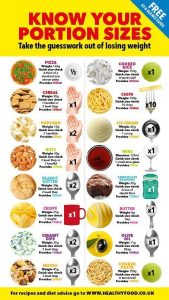Losing weight while eating properly is definitely possible. Here are some tips to help you achieve your weight loss goals while maintaining a healthy and balanced diet:
- Focus on whole, nutrient-dense foods: Choose foods that are rich in nutrients and fiber, such as fruits, vegetables, whole grains, lean proteins, and healthy fats. These foods will keep you full and satisfied, making it less likely that you’ll overeat.
- Practice portion control: Pay attention to serving sizes and use measuring cups or a food scale to ensure that you’re eating the appropriate amount. Avoid mindlessly snacking or eating out of large containers.
- Avoid processed and high-calorie foods: Processed foods and foods high in calories, sugar, and unhealthy fats can contribute to weight gain. Try to limit your intake of these foods as much as possible.
- Prioritize protein: Protein is important for maintaining muscle mass and can also help to reduce cravings and promote feelings of fullness. Include lean sources of protein in each meal, such as chicken, fish, tofu, or beans.
- Plan your meals and snacks ahead of time: Take time to plan your meals and snacks for the week ahead of time. This can help you make healthier choices and avoid impulse eating.
- Practice mindful eating: Pay attention to your hunger and fullness cues, and try to eat slowly and without distractions. This can help you to avoid overeating and make more conscious choices about what you eat.
- Be consistent: Stick to a consistent eating pattern and try to eat at regular intervals throughout the day. This can help to regulate your appetite and prevent overeating.
Remember, weight loss is a gradual process and it’s important to be patient with yourself. It’s also important to create a sustainable and healthy eating plan that supports your long-term goals. Consider working with a registered dietitian to help you develop a meal plan that meets your individual needs and preferences.







Melissa Wilson
Losing weight while eating properly involves adopting a balanced and sustainable approach to your diet. Here are some strategies to help you achieve weight loss while still eating properly:
Create a calorie deficit: To lose weight, you need to consume fewer calories than you burn. Calculate your daily calorie needs based on your age, gender, weight, activity level, and weight loss goals. Aim to create a modest calorie deficit, typically around 500-750 calories per day, as this is considered a safe and sustainable rate of weight loss.
Focus on nutrient-dense foods: Opt for whole, unprocessed foods that are rich in nutrients and low in calories. Include plenty of fruits, vegetables, whole grains, lean proteins, and healthy fats in your meals. These foods provide essential vitamins, minerals, fiber, and protein, which are important for overall health and satiety.
Portion control: Be mindful of portion sizes to avoid overeating. Use measuring cups, a food scale, or visual cues to help you gauge appropriate portion sizes. Practice portion control by filling half of your plate with vegetables, one-quarter with lean protein, and one-quarter with whole grains or starchy vegetables.
Eat balanced meals: Each meal should include a combination of carbohydrates, proteins, and healthy fats. Carbohydrates provide energy, proteins support satiety and muscle maintenance, and healthy fats aid in nutrient absorption and help you feel satisfied.
Control snacking: Be mindful of snacks and choose healthier options. Opt for whole fruits, raw vegetables with hummus, Greek yogurt, nuts, or seeds. Plan your snacks ahead of time and portion them out to avoid mindless eating.
Practice mindful eating: Slow down and pay attention to your eating experience. Listen to your body's hunger and fullness cues, and eat until you're comfortably satisfied. Avoid distractions like screens or eating on the go, as they can lead to overeating.
Stay hydrated: Drink plenty of water throughout the day. Sometimes, thirst can be mistaken for hunger. Staying hydrated can help control appetite and prevent overeating.
Regular physical activity: Incorporate regular exercise into your routine to burn calories, support weight loss, and improve overall health. Aim for a combination of cardiovascular exercises (like brisk walking, jogging, or cycling) and strength training exercises (such as weightlifting or bodyweight exercises) to build muscle and boost metabolism.
Seek support and guidance: Consider working with a registered dietitian or healthcare professional who can provide personalized guidance and support. They can help you create a customized meal plan, address any specific dietary needs, and monitor your progress.
Remember, weight loss is a gradual process, and it's important to be patient with yourself. Focus on making long-term, sustainable changes to your eating habits rather than relying on quick fixes or restrictive diets. By adopting a balanced approach and incorporating healthy habits into your lifestyle, you can achieve weight loss while still eating properly and nourishing your body.